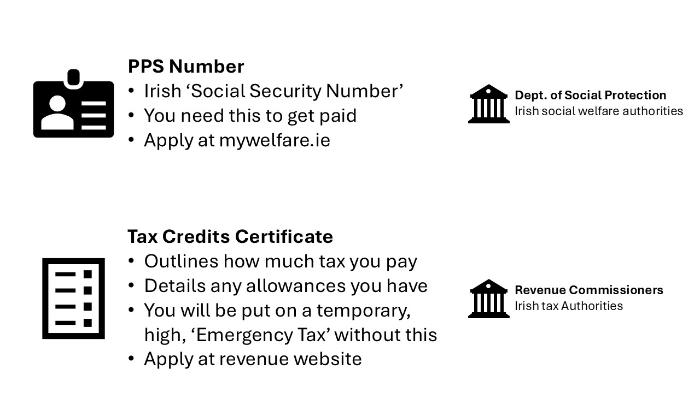Employee Permit Guidelines
Non-EEA nationals working in Ireland must have an employment permit. It is an offence for both the employer and the employee to employ a non-EEA national without an appropriate permit. UCD must ensure all our staff are legally entitled to live and work in Ireland.
Am I a non-EEA national?
Anyone who is not a citizen of the European Economic Area – which includes EU member states, along with Switzerland, Iceland, Norway and Liechtenstein – is considered a non-EEA national.
UCD HR will support non - EEA employees in obtaining valid work authorisation for roles eligible for work permits. The permits covered by UCD are
- Critical Skills Employment Permits
- General Employment Permits
- Hosting Agreements
Fast Track Work Permit for Researchers: Hosting agreements
A hosting agreement allows third-country researchers to carry out research in the EU. Only researchers on contracts issued by universities or other accredited organisations can avail of the Hosting Agreement scheme in Ireland. Hosting agreements are linked to the contract of employment offered by the relevant employer in Ireland.
Eligibility and criteria
Typical positions (but not limited to) include:
- Research Assistant
- Postdoctoral Researcher
- Research Fellow
- Research Scientist
- Lecturer engaged in research
Posts must be a minimum of 70% research. Therefore, it does not cover technical, administrative or academic staff, or lecturers not engaged in research.
The minimum salary threshold for applications is:
- €23,181 with no dependents
- €30,000 with dependents
The minimum contract duration must be at least 3 months in duration.
Application timeframe
Although the timeframe for application approval is swift – typically 1-2 weeks – the line manager and applicant need to bear in mind that other factors can significantly lengthen the application process.
These include: Funding approval confirmation, Staff request approval and contract issue, Entry visa requirements
Application fee
There is no application fee required for a hosting agreement.
Key provisions and benefits
- Allows for immediate family reunification, for example, a researcher can bring their immediate family (spouses and children only) to Ireland from the start of their employment (as long as the minimum salary threshold is €30,000)
- Application process is swift (excluding visa application process)
- After 21 months, an individual can apply for a Stamp 4
- No application fee involved
Further Information
Hosting Agreement Scheme terms and conditions can be found on (opens in a new window)EURAXESS, an organisation providing information and support for researchers seeking hosting opportunities.
Critical Skills Employment Permit
The Critical Skills Employment Permit is designed to attract highly skilled people into the labour market and encourage them to take up permanent residence in the State.
Critical Skills Employment Permits are issued for occupations where a high-level strategic skills shortage exists. They are issued for two years, and therefore, an application is dependent on a job offer of two years or more.
Eligibility
The following criteria must be met to successfully obtain a Critical Skills Employment Permit:
- Occupations with a minimum annual remuneration of €38,000 for a restricted number of strategically important occupations contained in the Critical Skills Occupations List. Applicants need a relevant degree qualification or higher.
- All occupations with a minimum annual remuneration of over €64,000, other than those on the Ineligible List of Occupations for Employment Permits or contrary to the public interest. A non-EEA national without a degree qualification or higher must have the necessary level of experience.
- Job offer must be for two years or more.
- The applicant must have the qualifications, skills and experience relevant to the particular role.
Application Timeframe
Critical Skills Employment Permit applications should be prepared well in advance of the proposed start date, approximately at least 12 weeks in advance of a start date.
As the processing timeframe can vary significantly, please read access the Government website for (opens in a new window)an accurate estimate at the time of application.
Application fee
A €1,000 fee applies for a Critical Skills Employment Permit, this is paid by UCD.
Key Provisions and Benefits
- Linked to the contract of employment offered by the relevant employer.
- The contract must be for a period of two years or more.
- Allows for immediate family reunification.
- After 21 months, an individual can apply for a Stamp 4.
Changing your Job on a Critical Skills Employment Permit
From 2 September 2024, if this is your first employment permit in Ireland, then you must stay with your employer for 9 months (previously 12 months), unless there are exceptional circumstances. After that, (opens in a new window)you can change employer.
You no longer have to make a new application for a Critical Skills Employment Permit if you want to change jobs. However, you can only change to a job within the same occupation or occupation classification on your original permit, for example, different engineering roles.
The following conditions apply:
- As the permit holder, you can make a maximum of 3 applications for a change of employer.
- A new contract of employment signed by both you and your new employer must be submitted.
- You must start employment with your new employer within 1 month of the new permit being issued.
You cannot start your new employment until the employment permit has been reissued. From 2 September 2024, you can be promoted or move internally within the same company if you will be using the same skills, and the job is still eligible.
If you qualify for a Stamp 4 after 21 months, you can change jobs without needing to apply for an employment permit.
Further Information
For further information on applying for a Critical Skills Employment Permit, please visit the (opens in a new window)Government webpage
General employment permits are used by the State to attract non-EU nationals for occupations experiencing a labour or skills shortage.
Eligibility
The following criteria must be met to successfully obtain a work permit:
- Annual salary on offer is €30,000 or more
- Post must be a minimum of 12 months in duration
- The category of occupation must be deemed eligible
- The applicant must have the qualifications, skills and experience relevant to the particular role
- Academics who have a salary below €64,000, have a relatively new PhD (less than 2 years) and have no relevant teaching experience are eligible
Ineligible Job Categories
The following job categories are deemed ineligible in applying for a work permit:
- All clerical and administrative positions
- All general operative and labourer positions
- All operator and production positions
Please see here for a (opens in a new window)comprehensive list of categories.
Application Timeframe
General Employment Permit applications should be prepared well in advance of the proposed start date, approximately at least 12 weeks in advance of a start date.
As the processing timeframe can vary significantly, please access the Government website for (opens in a new window)an accurate estimate at the time of application.
Key Provisions and Benefits
- Linked to the contract of employment offered by the relevant employer
- A (opens in a new window)labour market test must be completed in advance of the application
- Family reunification can take place after a one year waiting period
- Permit not required after five consecutive years of holding a permit. A Stamp 4 can then be applied for
- An application fee must be submitted. The fee amount is linked to the duration of the permit

